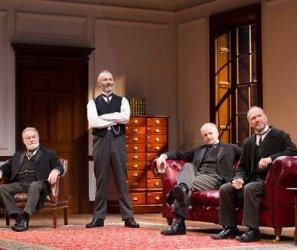Review - 'The Doctor's Dilemma' at the National Theatre 2012
Medical science and practice has certainly come a long way since the days when George Bernard Shaw wrote this play. In the first years of the twentieth century, there was no National Health Service in the UK, and little in the way of free medical treatment. Doctors charged fees for examining and treating patients, and for operations, making a more than healthy living in the process. But the procedures they carried out were not always based on rigorous medical evidence, and often it was the patients who paid rather more than the doctors' fees. No wonder, then, that Bernard Shaw saw an opportunity to lampoon doctors' expertise and knowledge in a play which is essentially a comedy, but which also has tragic elements and a rather shocking conclusion.
The play starts in the consulting rooms of one Colenso Ridgeon, a doctor who has just been knighted. A number of his colleagues from the medical profession arrive to congratulate him. In all, six doctors of varying ages, experience and specialisms fetch up at Sir Colenso's rooms. Sir Ralph Bloomfield Bonington ranks royalty among his patients, pretends to be scientific in his approach, but seems to understand little about the complexities of the human body. Mr Cutler Walpole is a surgeon who diagnoses almost every condition as resulting from blood poisoning. And Dr Leo Schutzmacher has managed to earn enough to retire from the profession by 'guaranteeing a cure' to unsuspecting patients - or should that be customers. Alone among his colleagues, Dr Blenkinsop is an impoverished GP who toils in a working-class area and barely scrapes a living serving an impoverished population who largely cannot afford to pay for medical treatment.
The newly-knighted Sir Colenso, seems a more scientific kind of doctor than most of his fellows. He has been awarded his knighthood for his research into tuberculosis which has resulted in him discovering a cure. But when Jennifer Dubedat tries to see him regarding her husband's illness, he first refuses to meet her until his housekeeper twists his arm. But when he does interview Mrs Dubedat, he falls in love with her and quickly plans to marry her if her husband should die.
Nadia Fall quite rightly ignores any temptation to tinker with the context of the play and sets her production in the appropriate era, around the turn of the last century. So, we find all the doctors happily puffing on cigars and wearing frock coats - though Dr Blenkinsop's coat has seen much better days. And Peter McKintosh's evocative set sports fine leather chairs and sofas and huge windows that overlook what presumably is meant to be Harley Street.
Malcolm Sinclair gets the lion's share of the laughs as Sir Ralph Bloomfield Bonington, or 'BB' as his colleagues call him. Maggie McCarthy is in excellent form as the bossy housekeeper Emmy who bullies the doctors, treating them like children. And Aden Gillett is Sir Colenso Ridgeon, a competent doctor who is nonetheless prepared to put his own feelings and romantic ambitions before the needs of his patient.
Shaw's condemnation of the medical profession of the Edwardian era might have been couched in comedic terms, but it must have packed quite a punch at the time. The medical profession today might be more scientific and more accountable than in the early twentieth century when Shaw was writing this play, but medical treatment, of course, is still denied to vast swathes of the world's population. So, this play still has some relevance in that respect. And financial gain has not yet been banished from the medical field which still invites unscrupulous private practitioners to perform unnecessary or risky procedures merely for monetary reward. And scarce resources and almost limitless demand force us to make (sometimes) arbitrary decisions about which patients get treatment. Thus, Shaw's play still gives us much food for thought.
"Whatever compensating sugars are added to Shaw's medicinal "tragedy", the production still leaves the bitter aftertaste of an opportunity let slip to dig more fruitfully into medicine, morality and human nature."
Dominic Cavendish for The Daily Telegraph
"Has plenty to commend."
Quentin Letts for The Daily Mail
"The play itself seems an awkward hybrid of satire and tragic love story. It's intriguing, but not quite what the doctor ordered."
Henry Hitchings for The Evening Standard
"A rich revival...It's a production that combines sharp satire with true feeling and, while exposing their lethal absurdity, resists the temptation to treat the doctors as easy caricatures"
Michael Billington for The Guardian
Originally published on
